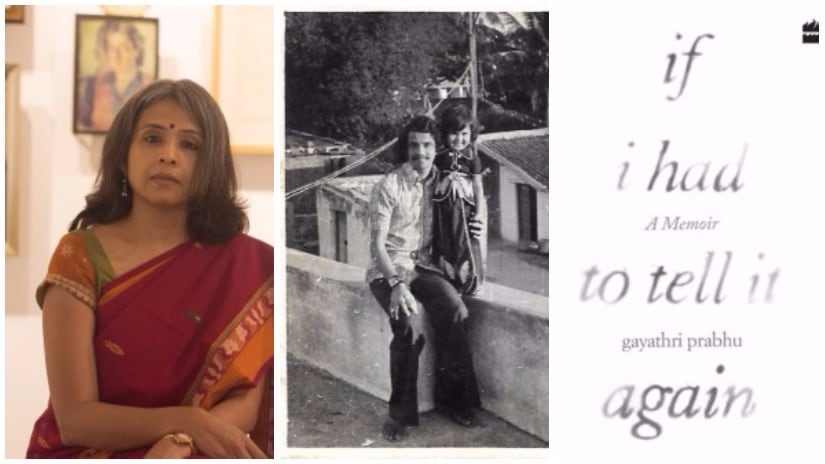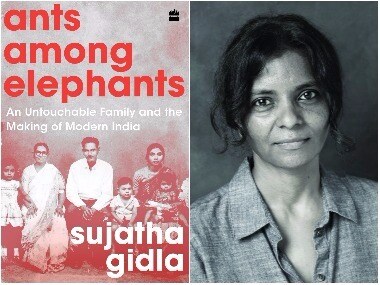When I finished Gayathri Prabhu’s memoir If I Had to Tell It Again, I was so overcome with emotion that I threw the book from one end of my couch to the other — as if distancing myself from it physically would help me cope with the wave of feelings that were washing over me by turns.
If I Had To Tell It Again is a book of incredible generosity. The generosity is for us, the reader, whom she welcomes into her life without fanfare. She has decided to let us in to her life, her resolve unwavering through the book. She then delivers an intimate account that is not only original but also one that will hopefully lead to the publishing industry opening up more and more space, giving women the ultimate power – the right to tell their own stories, as they want to, and talk of the men in their lives on their terms.
Gayathri trains her lens on her life, without concessions for anyone, and takes us through the many intense, torrential and brief but iridescent, kind moments that comprised it. The book had me wincing, frequently. I had to put it away twice before I could go back to it and yet, I cannot recommend it enough. It is perhaps exactly why I would recommend it. It needs to be read. It is important, because it talks about the things women are constantly trained to sweep under thick carpets.

(L) Gayathri Prabhu; Photo by Michael Ampat Varghese; (R) If I Had To Tell It Again is published by HarperCollins
A story of extraordinary suffering and love, the memoir allows us a peek at her relationship with her father whom she refers to as SGM, and who passed away last year. Her mother appears briefly and once in parenthesis, reminding her of her father’s kindness, perhaps wanting the daughter to be kind to the father. And her sister is there, through it all, like a rock in the way only sisters can be. But really it is a book about her making sense of a man who towered large.
Through the course of her book, you can locate her father and her – in the social, economic as well as ideological plane. In these days of polarising ways, had Gayathri put them all together in one neat sentence, it would have made for more eyeballs. But she doesn’t. These details emerge slowly through the book, just the way one would discover a person over years. She allows us to discover father slowly, even though she has known him in his entirety. Because she isn’t out to take revenge on her father. She writes with eloquent empathy and utter bewilderment, about her love and his rage. She is thoroughly beguiled by this man who has shaped her entire life – and has passed on his clinical depression.
It must not have been easy to write something like this. One hopes it was cathartic but one can never be sure. For instance, this one memory she writes about that had me wincing was, when as a young girl she is trying to make sense of Math and her father — growing frustrated and disappointed that she isn’t already the star he so wants her to be — stabs a lit cigarette on her, repeatedly… The memoir shows her walking uncertain, stormy roads – through the abuse at the hands of men known and unknown, through years of depression and suicidal tendencies, miscarriages, divorce, and floating listlessly across continents.
Gayathri’s sparkling prose is light, as it meanders artfully conveying memories heavy, laden with emotions. The experimentation in form, a one-act play in the middle of the memoir, that at first had me wondering if it was the right thing for the book, halfway through had me utterly convinced that it in fact was. Somehow, it was. That conversation between a man, woman and shadow…. It helped translate the passing on of the listlessness and the despair, the all-consuming darkness from the father to the daughter. Though, unlike wealth, one is never poorer for passing it on. Somehow darkness is elastic.
The hope and the unconditional kindness in this book, and in the author’s life come from the other soul this book is dedicated to. Chinna, Gayathri's dog. The last years of Chinna as well as the last part of the book overlap. Chinna saves Gayathri’s life one tempestuous night and comes back into it years later to claim her time with the author. In those pages in the book Gayathri pours forth a love unfathomable to someone like me, who has never had a pet, though it was impossible to be untouched by it. It moved me... It was because of what Chinna means to Gayathri. It is also here that Gayathri lets us know that she is with a man of kindness, finally, one who loves Chinna too and is reading about death from ancient scriptures to calm them both down in those last days.
Even though this is an extraordinary story and the pain is so very personal, there is something in it that connected with me. Something visceral, that if I just stretched my hand out, I could perhaps even grasp. Pain has a powerful way of connecting women. We have always spoken to each other about it, but reading about it, from one of us and not someone from a distant land, has left me with a multitude of emotions. Most prominent of which is, gratefulness.
In my opinion this book was necessary. An essential one. It had to be written. Gaythri says it most eloquently in this paragraph in the memoir: “… to be silent would be to collude with the collective denial and discomfort about mental illness. I learnt this about child abuse as well – the most valuable advice is to talk about it, to tell someone and even though telling is just a start, it is needed. Otherwise, the shame is muted and the muted stays shameful, slowly snuffing out one’s spirit. This is why one writes a memoir…”
Published Date: Jan 05, 2018 16:10 PM | Updated Date: Jan 05, 2018 16:10 PM

















